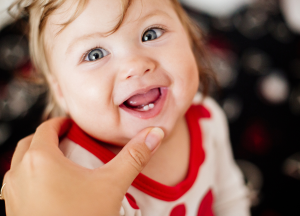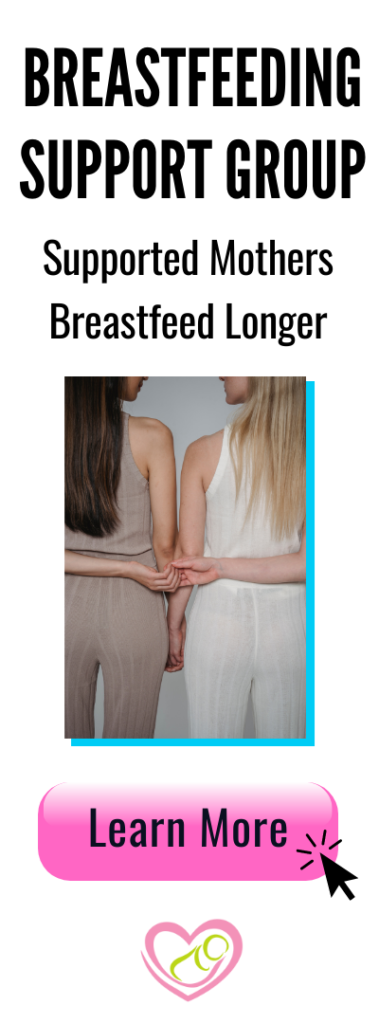Why Your Breastfed Baby Bites—and How to Stop It
May 4, 2025 2025-05-04 6:41Why Your Breastfed Baby Bites—and How to Stop It
Why Breastfed Babies Bites—and How to Stop It

Some babies never bite, some will try it, and others go through a biting phase. We know how painful, frustrating, and anxiety-inducing this can be! It can be difficult to not give up on your breastfeeding journey—but remember, your baby isn’t trying to hurt you. If you’ve ever experienced your breastfed baby biting during nursing, you’re not alone. Many parents go through this phase, especially during teething. By knowing what to look for, you’ll be able to get through this stage and continue your breastfeeding journey.
My baby bit me, do I need to stop breastfeeding?
No. This a common misconception, especially when teething begins. Biting is not a long term habit— it is often a one time thing, or a temporary phase that can be corrected.
Why do babies bite the breast that feeds them?
- Teething: Biting down eases the pressure and feels soothing on sore gums.
- Distraction/Boredom: Babies between 3-7 months become aware of their environment and develop a greater interest in their surroundings. They might become fussy at the breast and start biting out of boredom or because they have lost interest in feeding.
- Incorrect latch: most commonly, this biting happens when you are just getting started on your breastfeeding journey. A shallow latch might feel like a bite! Alternatively, if your baby doesn’t achieve good suction they may clamp down in an attempt to keep the nipple in their mouth.
- Congestion/Ear Infection: It may be hard to swallow with blocked ears or nose
- They’re playing or exploring: Older babies especially use their mouths to explore, and may bite just to see what happens.
- Attention Seeking: Sometimes, your baby just wants you to focus on them!
How do I make it stop?
Patience is key. It might take a few days or weeks to get your baby to stop biting you, but with the right tools, you’ll be back to nursing as normal! If you are still having issues with biting after trying these tips, schedule a session with one of our lactation consultants.
5 Ways to Deal With Biting While Breastfeeding
- Prevent. Watch for these early warning signs so you can unlatch them before it happens;
- slowed or absent sucking
- shifting attention or turning head
- jaw tension or shift in jaw position
- Respond. Remain calm but be firm to let them know they are hurting you.
- Don’t yell—it can scare them and cause nursing refusal.
- Say a firm “No biting” or “Ouch, that hurts” with a serious facial expression.
- Pause the feeding for a moment to show biting has consequences.
- Improve baby’s latch. A deep latch makes biting harder. Review the basics of latch & positioning HERE!
- Baby’s lips should flange outward
- Chin touches the breast
- Tongue should extend over lower gums
- Offer teething relief. If biting is from teething:
- Use a cold teething ring or chilled damp cloth before feeding
- Gently massage gums
- Try teething-safe remedies approved by your pediatrician
- Keep baby focused. Babies bite more when distracted, overstimulated, or looking for your attention:
- Nurse in a quiet, low-stimulation environment. Turn the lights down low, play soothing music, maybe even use a nursing cover to reduce external stimulation.
- Make eye contact and use a feeding necklace to keep their attention on you
- Keep your attention on your baby—this is not the time to multitask!
- Praise good nursing behavior
How Do I Heal My Nipples?
If biting causes soreness or damage, please reach out to a lactation consultant for help preventing infection and protecting your milk supply. In the meantime, practice good nipple care:
1. Apply Breast Milk
- Breast milk has natural antibacterial and healing properties. After each feeding, express a few drops and gently rub it onto the nipple. Let it air dry before covering.
2. Use Nipple Cream
- A good nipple balm (our favorite is Earth Mama Nipple Butter) is effective for soothing and moisturizing
- Coconut oil or olive oil (if baby isn’t allergic) are natural alternatives
3. Try Hydrogel Pads
- These cool, gel-based pads provide instant relief and help protect the skin as it heals. Store them in the fridge for added soothing power. There are many brands and options available!
4. Avoid Harsh Soaps or Scrubbing
- Clean nipples with warm water only—soap can dry out or irritate sensitive skin.
5. Use Breast Shells Between Feeds
Medela Breast Shells for Sore Nipples create a buffer between your nipple and clothing, allowing air circulation and reducing friction.
8. Take a Break (If Needed)
If the damage is severe, pumping temporarily can give your skin time to heal—just ensure you’re still expressing milk regularly to maintain supply.
Remember, if your breastfed baby is biting, you’re not alone—and it doesn’t mean your nursing journey has to end. This phase is often brief and manageable with patience, gentle guidance, and a little strategy. Your baby is learning, growing, and exploring, and with your calm, consistent response, they’ll soon understand that biting has no place at the breast. Be kind to yourself, care for your body, and trust that you’re doing a wonderful job navigating one of the many ups and downs of parenthood. You’ve got this!


